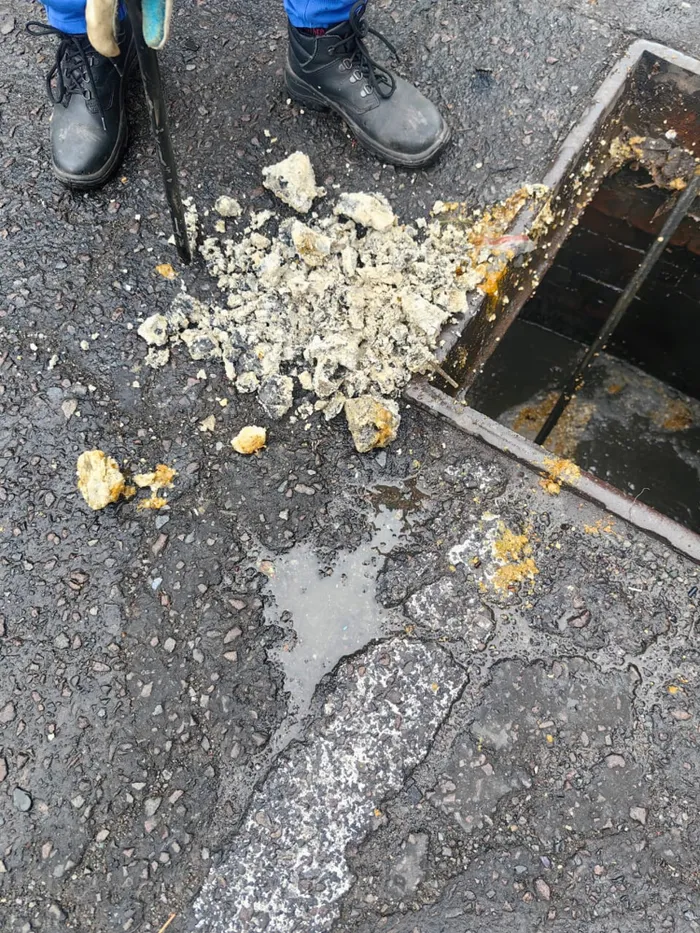
Fat oils clogging up municipal sewer lines outside a building in Durban Central. The municipal law enforcement operations removed 2 917 illegal connections.
Image: eThekwini Municipality
The eThekwini Water and Sanitation stated that the courts were not pursuing non-compliance notices when it came to illegal connections to the sewage infrastructure
The municipal law enforcement operations, rooting out illegal connections, led to 2 917 pipes being removed.
In a response to Ward 35 councillor Bradley Singh, the municipality stated that it was aware of 16 608 illegal connections.
The municipality stated that site investigations need to be conducted to confirm any form of illegal activity. Between 2020 to 2025, approximately 17 334 properties were investigated. A total of 14 417 properties did not have illegal connections.
It conducted street-by-street programmes and responded to tip-offs, adding that it did not have the total number of compliance notices issued over the past five financial years.
However, previously, summons would be issued but that stopped in 2020 due to the courts not pursuing these matters.
“New by-laws have been established and admission of guilt fines have been approved by the Chief Magistrate. Currently with legal to take to council for inclusion into the current system of delegations,” the municipality stated.
Prior to 2024, all illegal connections were removed. However in 2024, the municipality said, where possible, these connections were regularised and customers brought onto the billing system.
Singh was concerned about how the city is addressing illegal connections to the sewer system through the Stormwater Management By-law, 2020.
Many informal settlements, said Singh, route their sewage pipes into stormwater drains. According to the municipality, the pollution department looks into places with unlawful connections and involves law enforcement and building inspectors to issue tickets and remove the spots.
Singh said the municipal sewage crisis worsens with an overwhelming number of illegal connections despite repeated complaints from residents about raw sewage overflowing into streets and waterways.
“Shockingly, 14 417 reported cases were dismissed after investigations, raising concerns about the effectiveness of enforcement. Illegal connections outpace removal efforts. New fines approved but still awaiting council approval and delaying justice.”
He called for a dedicated task force to deal with investigations as they are reported, adding that informal settlements were a major contributor to illegal connections and pollution yet there was no sustainable solution.
Singh said failure to enforce by-laws and hold offenders accountable has led to:
He suggested that the municipality must:
Recently, the Kloof Conservancy reported that the Mend the Molweni (MtM) Project has been keeping an eye on pollutants coming into the catchment (which compromise the headwaters of the Molweni River), and educating the public on the importance of river health.
Conservancy spokesperson Paolo Candotti said their objectives have always been to work collaboratively with the local private sector, local government departments, and civil society. They had three sewer incidents on Old Main Road recently.
“In all three incidents, eThekwini Water and Sanitation teams have been great and responded on the same day to address the problem. This is fantastic service. We have also been able to engage private sector partners about the causes of these sewer surcharges and are hopeful that we will solve our second pair of hotspots in the near future,” Candotti said.
The MtM was also concerned about an urban phenomenon and one, it said, that is arguably more dangerous to infrastructure issues.
“Illegal connections from houses and businesses that take stormwater into the sewer lines result in massive inflows of liquid into pump stations during rain events. This is also often combined with sand and solid foreign objects.
“The massive inflow of water can lead to pump stations filling up too quickly for the pumps to manage. This causes the pump station to overflow diluted sewer into stormwater culverts and into river,” Candotti said.
zainul.dawood@inl.co.za
Related Topics: